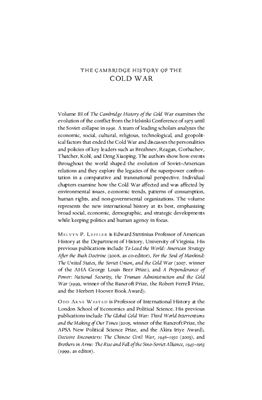Cambridge University Press, 2010. - 620 pp.
This volume examines the evolution of the Cold War from the Helsinki Conference of 1975 until the Soviet collapse in 1991. Leading scholars analyze the economic, social, cultural, religious, technological, and geopolitical factors that shaped the policies that ended the Cold War, looking at the personalities and policies of Carter and Reagan, Brezhnev and Gorbachev, Thatcher, Kohl, and Deng Xiaoping. They show how events throughout the world shaped the evolution of Soviet-American relations and also explore the legacies of the super-power confrontation in a comparative and trans-national perspective. Penetrating chapters examine how the Cold War affected and was affected by the environment, the global economy, consumer capitalism, human rights and non-govemental organizations. The authors also deal with demographic trends, capital flows, multilateral institutions, and geopolitical configurations. This is inteational history at its best: emphasizing social, intellectual, economic and geostrategic trends without losing focus on personalities, politics, and human agency.
This volume examines the evolution of the Cold War from the Helsinki Conference of 1975 until the Soviet collapse in 1991. Leading scholars analyze the economic, social, cultural, religious, technological, and geopolitical factors that shaped the policies that ended the Cold War, looking at the personalities and policies of Carter and Reagan, Brezhnev and Gorbachev, Thatcher, Kohl, and Deng Xiaoping. They show how events throughout the world shaped the evolution of Soviet-American relations and also explore the legacies of the super-power confrontation in a comparative and trans-national perspective. Penetrating chapters examine how the Cold War affected and was affected by the environment, the global economy, consumer capitalism, human rights and non-govemental organizations. The authors also deal with demographic trends, capital flows, multilateral institutions, and geopolitical configurations. This is inteational history at its best: emphasizing social, intellectual, economic and geostrategic trends without losing focus on personalities, politics, and human agency.

